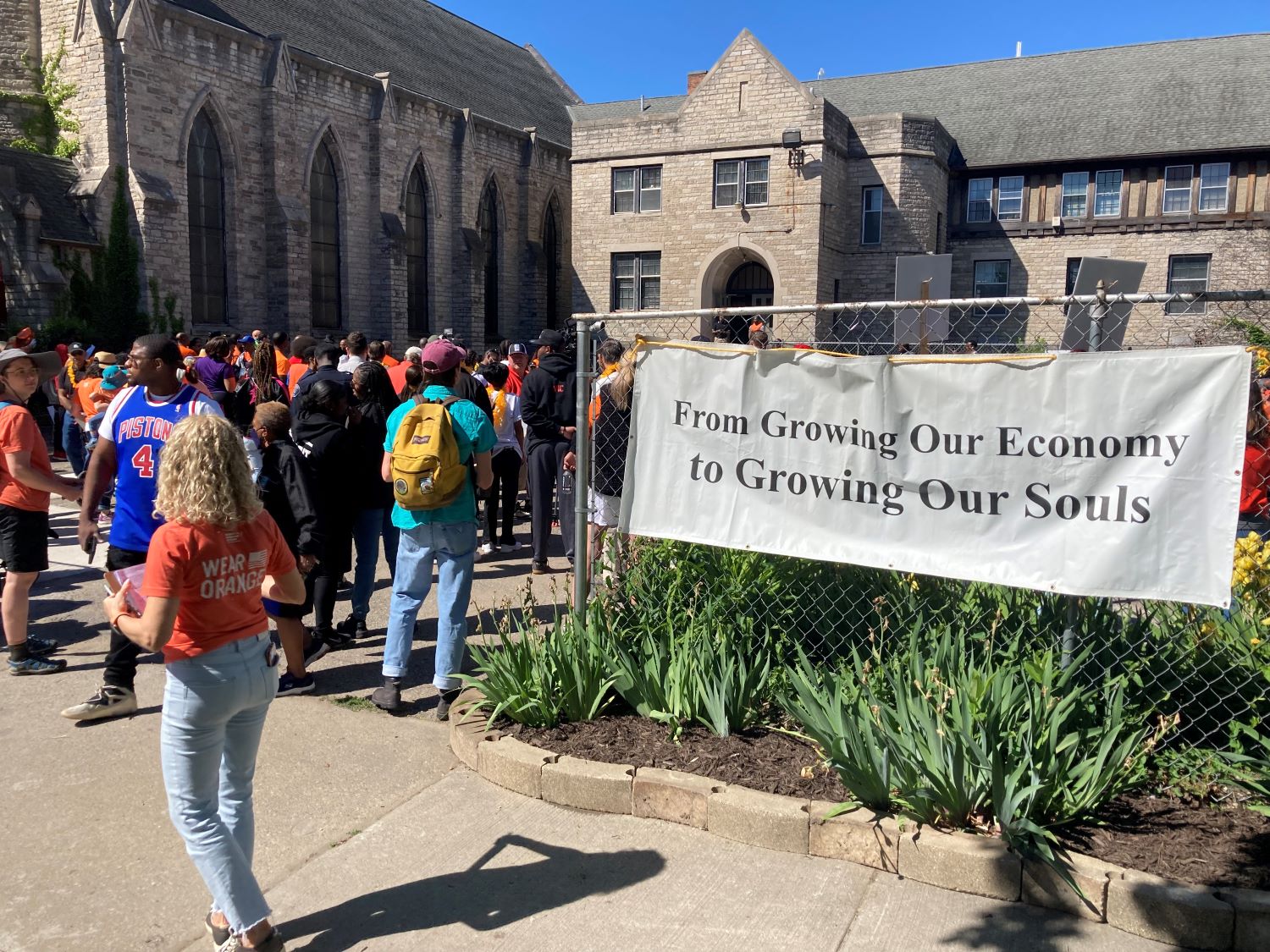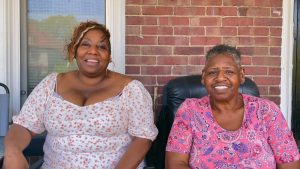
For decades Detroiters have witnessed gentrification, displacement, marginalization, corporate and elite political control, and sale (stealing) of land. This is while simultaneously engaging in struggles to end water shut-offs while calling for fair water plans based on need, and challenging foreclosures and evictions.
As police throughout the country display their views on the value of the Black body, locally we are challenging police budgets, and their acts of brutality and murder while creating alternatives to video surveillance with a fundamental commitment to a self-governing democracy without police and discriminatory policies and practices. This essentially translates to community safety teams and uplifting visionary work and existing alternatives that exist to replace the carceral system.
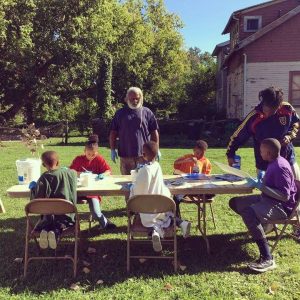
The beauty and uniqueness of Detroit is the fact that we are not waiting by the sidelines for change. We are fighting and creating the change we wish to see while fostering beloving communities and liberated zones.
The notion of beloving communities focuses on the understanding that we all have something to contribute to our community and encourage the growth of a place-based network of self-sustainability and self-sufficiency through interconnectedness and interdependence.
The creation of place-based visionary resistance has been the response to the notion of attempted control and displacement inflicted upon by corporate and political bullies. Place-based visionary resistance is an important factor of fostering beloving communities because it implies that “They may be moving in… but we are not moving out.” How are we continuing to claim space in our communities where colonization implies that we should no longer exist?
Applying a visionary-based ideal suggests that we create transformation through place-based organizing, building critical connections and relationships, while creating community. For example, this commitment is emphasized by The Boggs Center as they believe in moving beyond rebellion and protest, to revolution rooted in visionary organizing.
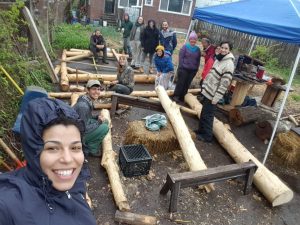
This theory of change has manifested and dispersed throughout our east side neighborhoods as individual expressions and practices, weaving through the Islandview neighborhood and farther east to Jefferson-Chalmers, furthermore creating synergy and bringing expressions to fruition through actions and initiatives. Whether this has taken place on a residential level, community and grassroots level, or within the workings of a nonprofit organization, the message remains the same. We are here to stay and we are invested in transforming our communities with the future and today in mind.
While it is critical that we evolve through changing policies within local government, it’s also critical that we imagine a safe, inviting community for every member of our neighborhood, and recognize the work that is already being done. Change happens one person at a time, one block at a time, and without depending solely on government officials.
We create this transformation of dependence through changing culture, changing relationships, creating institutions to feed ourselves, creating safety, educating ourselves and our neighbors, and turning to each other to build the future in the ashes of the old. Here we provide an overview of some of the organizations across Detroit working to bring these visionary imaginations to reality.
Fostering visionary leadership
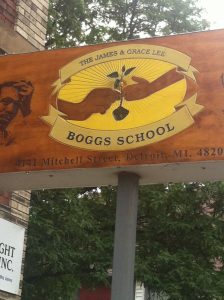
The Boggs Center centers the development of leadership within the community is the basis of their mission. Inspired and founded by the historical work of James and Grace Lee Boggs, the center continues the tradition of encouraging and fostering leadership from within the community.
Rooted in the humanist {r]evolutionary values and teachings of the Boggs Center, The James and Grace Lee Boggs School nurtures creative, critical thinkers who contribute to the well-being of their communities. As a place-based education-focused school, it allows for the expansion of the mindset of children rather than confining it to the cookie-cutter lesson plans and ideals forced upon in traditional school models.
Community safety & transformative justice
The campaign initiated by Feedom Freedom Growers to replace green lights – city surveillance tools – with green chairs, promotes the idea of the need to move toward community safety and surveillance rather than the unilateral and inhumane control wielded by law enforcement and city officials.
Taproot Sanctuary exposes the need and deepens the understanding for transformative justice as key to community safety. They foster community through partnerships with others to create spaces for healing, resilience, and restoration. Prior to COVID, they offered solidarity housing and currently host workshops and retreats that center our relationship to nature and each other.
The Detroit Black Food Security Network was formed in response to the need for local and specifically Black residents to be in leadership in the building of critical community agricultural development. Using a lens of food justice and security a prime goal of the organization is to create systems that don’t need to rely upon outside factors to provide crucial resources for community survival.
Community leadership & advocacy
Block clubs such as the Field Street Block Club and Charlevoix Village Association (CVA) support their neighbors through mutual aid fundraising to help neighbors with home repair and host a community fridge where anyone in need of food can take as they please while others who have plenty can leave nourishment for others.
They also believe in advocating for accountability and transparency from city officials. CVA hosts organizing, protests, and speak outs at city council meetings meetings to denounce the displacement of residents. They also produce factsheets for residents regarding emerging developments.
Community development
Church of the Messiah serves as more than a place of worship as they host annual anti-violence rallies, cultivate creativity through makerspaces, promote wellbeing through community gardens, support the need for digital equity through the Equitable Internet Initiative, and hold monthly coalition meetings, while also working to rebuild the neighborhood through the low income housing options they provide. Their space also serves as a small business incubator.
Others such as Genesis HOPE Church and The Commons on Mack are cultivating community through their offerings of communal space and needed resources for gatherings.
The Eastside Solutionaries Collective holds an annual community fair to display the efforts of the groups mentioned here and others for the awareness of neighbors who may not be familiar with visionary efforts for creating change. Emerging from the community benefits struggle between the City & Stellantis (formerly Fiat-Chrysler) at the Jefferson Assembly plant, this group believes in the importance of promoting self-sufficiency and self-sustainability efforts as it is what will move us forward as a community in the future.
These efforts challenge us to think of how we can further help ourselves and our neighbors as we learn to move differently collectively. As Danny Glover, the keynote speaker for their inaugural fair paraphrased from Martin Luther King’s speech, how can we foster beloving communities? As we see here, Detroiters are already answering this call.
Through this re-creation and redefining of what home is, we create peace zones, freedom, and liberated zones – we are creating a new home.
Rukiya Colvin is the energy, vision, and committed individual to the recent east side initiative – East Side Solutionaries Collective and newsletter.
Rich Feldman has been given the gift of more than 50 years with James and Grace Lee Boggs, the Boggs Center and most recently the East Side Solutionaries Collective which emerged from the community benefits struggle with the City & Stellantis (formerly Fiat-Chrysler) at the Jefferson Assembly plant.

